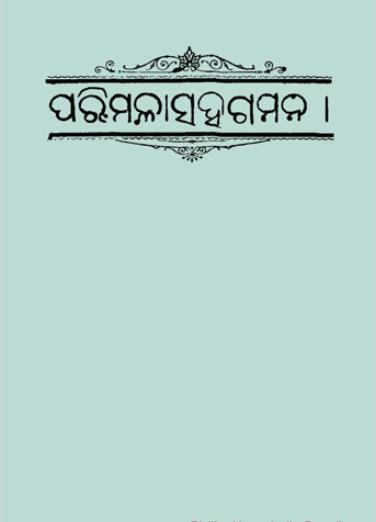Published in 1912, Parimala Sahagamana is a remarkable contribution to Odia literature, authored by the venerable playwright Radha Mohana Rajendra Deba. This drama stands out not only for its artistic expression but also for its exploration of profound themes and its reflection of socio-cultural dynamics prevailing in early 20th-century Odisha. Through this work, Rajendra Deba captures the complexities of human relationships, societal norms, and the shifting landscapes of identity and aspiration.
The early 1900s in India was a period marked by a resurgence of interest in literature and the arts, coinciding with growing nationalist sentiments and social reform movements. As Odisha emerged from colonial influences, local writers began to assert their cultural identity through various literary forms, including drama. Parimala Sahagamana emerges within this vibrant context, serving as both a reflection of contemporary life and an exploration of timeless human themes.
At its core, Parimala Sahagamana delves into the intricacies of love, sacrifice, and social obligation. The title itself, which can be roughly translated to The Fragrance of Togetherness, evokes a sense of intimacy and interconnectedness that permeates the narrative. Rajendra Deba skillfully interweaves personal and social narratives, highlighting how individual desires often clash with societal expectations.
The play explores various characters, each grappling with their unique dilemmas, embodying different facets of Odia society. Themes of duty towards family, the struggle for personal freedom, and the quest for love feature prominently, allowing audiences to empathize with the characters’ journeys. Through these characters, Rajendra Deba comments on the rigid societal norms that often dictate personal choices and the emotional turmoil that ensues from such constraints.
Parimala Sahagamana is structured in a manner typical of early 20th-century Indian dramas, combining dialogue with monologues that provide insight into the characters’ psychological landscapes. Rajendra Deba’s writing is characterized by its lyrical quality, often infused with poetic devices that elevate the emotional intensity of the narrative.
The dialogue is rich and layered, reflecting the cultural nuances of Odisha. Through the use of colloquial language and idioms, the playwright paints an authentic portrait of his characters, making their struggles relatable and poignant. The use of humor, when appropriate, serves to balance the heavier themes, adding a layer of complexity to the dramatic experience.
The impact of Parimala Sahagamana on Odia drama cannot be overstated. Rajendra Deba is recognized as one of the pioneers of modern drama in Odia literature, and this work solidified his reputation as a significant voice in the literary landscape. The themes explored in the play continue to resonate with audiences, making it a relevant and insightful reflection on the human experience.
Subsequent generations of playwrights and writers have drawn inspiration from Rajendra Deba’s ability to meld emotional depth with societal commentary. The play has paved the way for more nuanced explorations of character and conflict within Odia drama, encouraging a departure from purely didactic narratives to more complex, character-driven stories.
Books Info
| Books name | Parimala Sahagamana / ପରିମଳ ସହଗମନ |
| Author | Radha Mohana Rajendra Deba |
| No Of pages | 123 |
| Publisher | NA |
| Publication | 1912 |
| Printed At | The Utkal Sahitya Press |
| Distributor | NA |

